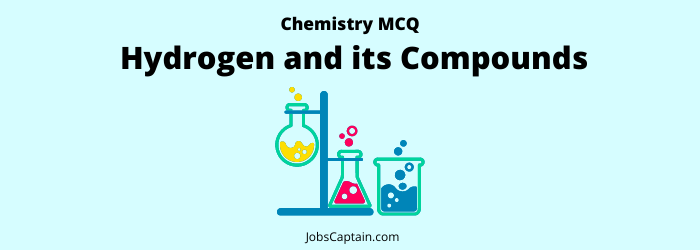
Are you ready to test your knowledge on hydrogen and its compounds? Take this quiz to see if you have a firm grasp on the basics of this important element in chemistry! Challenge yourself and see how well you know the facts about hydrogen and its compounds.
Question 1. Heavy water is a type of ____________.
(A) Coolant
(B) Moderator
(C) Ore
(D) Fuel
Question 2. The chemical formula of Heavy Water is _____________.
(A) H2S
(B) H2CO3
(C) D2O
(D) H2O
Question 3. The substance used as moderator and coolant both, in nuclear reactors is _________.
(A) Liquid Hydrogen
(B) Liquid Ammonia
(C) Heavy water
(D) Ordinary water
Question 4. What is heavy water?
(A) Heavy Hydrogen + Heavy Oxygen
(B) Hydrogen + New Oxygen
(C) Hydrogen + Oxygen
(D) Oxygen + Heavy Hydrogen
Question 5. Heavy water is that water __________.
(A) In which isotopes takes place of Oxygen
(B) In which isotopes takes place of Hydrogen
(C) In which insoluble salts of Calcium and Potassium are present
(D) The temperature of which is kept constant at 4ºC
Question 6. Heavy water _________.
(A) Contains organic impurities
(B) Contains more dissolved minerals and salts
(C) Contains deuterium in place of Hydrogen
(D) Contains more dissolved air
Question 7. Who among the following discovered heavy water?
(A) Joseph Priestly
(B) H.C. Urey
(C) H.C. Urey
(D) Heinrich Hertz
Question 8. Heavy water has molecular weight?
(A) 54
(B) 36
(C) 20
(D) 18
Question 9. Which one of the following catalysts is used in hydrogenation of vegetable oils?
(A) Iron
(B) Nickel
(C) Platinum
(D) Zinc
Question 10. Permanent hardness of water is due to ________.
(A) Magnesium bicarbonate
(B) Magnesium bicarbonate
(C) Calcium bicarbonate sulphates
(D) Chlorides and sulphates of Calcium and Magnesium
Question 11. The pH value for water is __________.
(A) 8.7 or more
(B) 5 or less than 5
(C) Nearly 7
(D) Nearly zero
Question 12. Which is the purest form of water?
(A) Distilled water
(B) Rain water
(C) Sea water
(D) Tap water
Question 13. Water is a good solvent of ionic salts because ___________.
(A) It has no colour
(B) It has a high specific heat
(C) It has a high dipole moment
(D) It has a high boiling point
Question 14. Large quantities of drinking water is prepared from impure water by ___________.
(A) Decantation
(B) Ion-exchange
(C) Distillation
(D) Desalination
Question 15. Which gas is used in the purification of drinking water?
(A) Carbon Dioxide
(B) Fluorine
(C) Chlorine
(D) Helium
Question 16. By which process the sea water can be converted into pure water?
(A) Reverse osmosis
(B) Electric separation
(C) Efflorescence
(D) Deliquescence
Question 17. The process used for transforming salty water into pure water is called __________.
(A) Reverse osmosis
(B) Electric separation
(C) Efflorescence
(D) Deliquescence
Question 18. By which process, Alum cleans the muddy water?
(A) Dialysis
(B) Coagulation
(C) Adsorption
(D) Absorption
Question 19. The gas used in the manufacture of Vanaspati Ghee from Vanaspati Oil is __________.
(A) Carbon dioxide
(B) Nitrogen
(C) Oxygen
(D) Hydrogen
Question 20. Consider the following statements. Hard water is not suitable for:
- Drinking
- Washing clothes with soap
- Use in boilers
- Irrigating crops
Which of these statements are correct?
(A) 1, 2, 3 and 4
(B) 1, 2 and 4
(C) 2 and 3
(D) 1 and 2
Question 21. Which one of the following fuels causes minimum air pollution?
(A) Diesel
(B) Coal
(C) Hydrogen
(D) Kerosene oil
Question 22. According to weight, the percentage of hydrogen in water (H2O), is __________.
(A) 11.11%
(B) 88.89%
(C) 5.55%
(D) 44.45%
Question 23. An element X has four electrons in its outermost orbit. What will be the formula of its compounds with hydrogen?
(A) XH4
(B) XH3
(C) X4H4
(D) X4H
Question 24. Burning of Hydrogen produces?
(A) Water
(B) Soil
(C) Ash
(D) Oxygen
Question 25. One mole of Hydrogen gas burns in excess of Oxygen to give 290 kJ of heat. What is the amount of heat produced when 4g of Hydrogen gas is burnt under the same conditions?
(A) 1160 kg
(B) 580 kg
(C) 290 kg
(D) 145 kg
